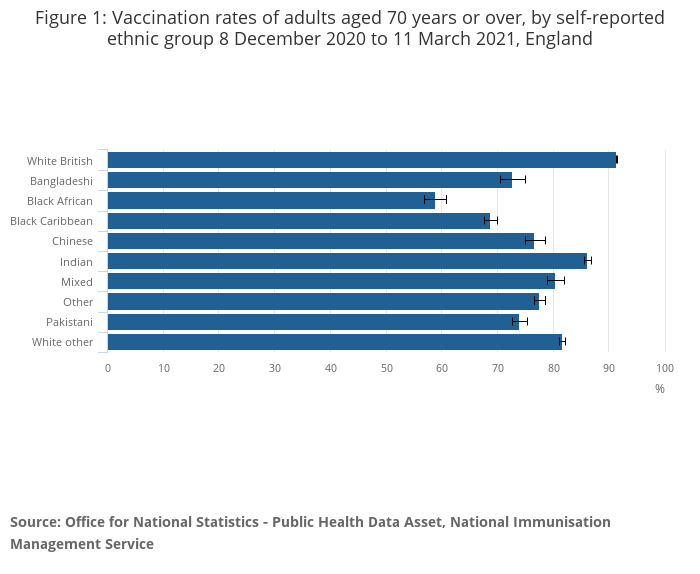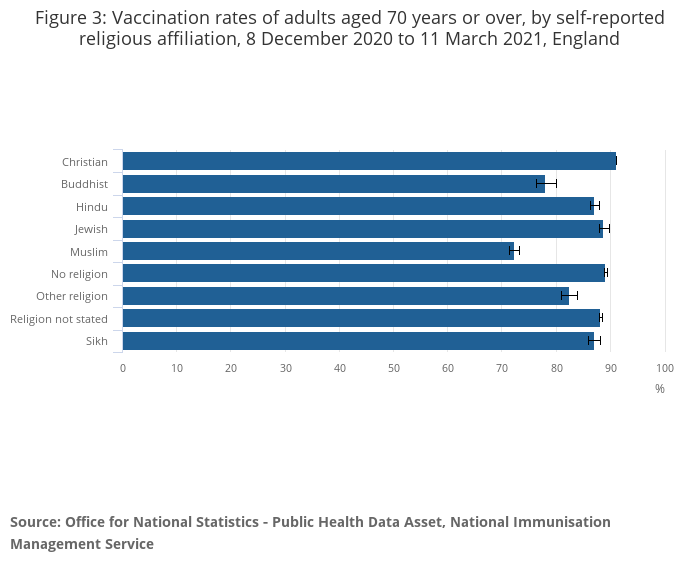Covid Vaccine Rates Are Significantly Lower For Black Brits, New ONS Data Shows
3 min read
New data on the demographics of the Covid-19 vaccine rollout has revealed vast disparities along ethnic and religious lines.
Analysis from the Office For National Statistics (ONS) shows 91.3% of White British people over the age of 70 had their first jab, while that figure was just 58.8% for those identifying as Black African.
The overall figure for residents in England who had received at least one dose of a coronavirus vaccine between 8 December 2020 and 11 March 2021 was 90.2%.
But the vaccination rates for Black Caribbeans was reported at 68.7%, people from Bangladeshi backgrounds was 72.7%, and Pakistani backgrounds 74%.
The ONS also found the numbers differed by religious affiliation, with the lowest rate being among those who identified as Muslim at 72.3%, followed by Buddhist at 78.1%.
Statisticians said they had identified a “clear relationship” between areas with higher levels of deprivation and lower vaccination rates.
The study said: “The vaccination rate in the most deprived areas was 87%, compared with 92.1% in the least deprived.
"Adjusting for geographic factors, socio-demographic characteristics and underlying health conditions did not substantially reduce the difference in the odds of not being vaccinated for all quintiles groups compared with the least deprived one.”
The ONS also said there was statistical evidence the differences between White British people and those from Bangladeshi and Pakistani backgrounds “were more pronounced among those living in deprived areas than among those living in wealthier areas”.
Their report adds: “Statistical modelling shows that accounting for differences in geography, socio-demographic factors and underlying health conditions does not fully explain the lower vaccination rates among ethnic minority groups.

“For example, the odds of not having received a dose of the vaccine were 7.4 times greater for people from Black African backgrounds compared with people of White British ethnicity.
“After adjusting for age, sex, socio-demographic characteristics and underlying health conditions, the odds were still 5.5 times greater.
“This indicates that the factors included in the model explained only about 30% of the unadjusted differences in the odds of not having been vaccinated.”
The study, which linked vaccination stats from the National Immunisation Management Service to ONS records based on NHS and other health data with figures from the 2011 census, also shows the vaccination rate was slightly higher for females at 90.4 % than males at 90%.

The highest age group for getting at least one dose of a Covid-19 vaccine was among the 80 to 84-year-olds, at 92.6%, while that drops to 88% for the over 90s, 83% for the over 95s, and just 71.1% for those aged more than 100.
The vaccination rate was also lower for people living in a care home, at 86.4%, than those in private households or other accommodation, which is 90.3%.
Responding to the figures the vaccines minister Nadhim Zahawi tweeted: “This is exactly why we need to make sure that nobody is left behind. Real focus on the most vulnerable cohorts 1-9.
“Much more work to do with local communities. Seeing amazing people coming forward to help deliver the message that vaccines protect you.”
